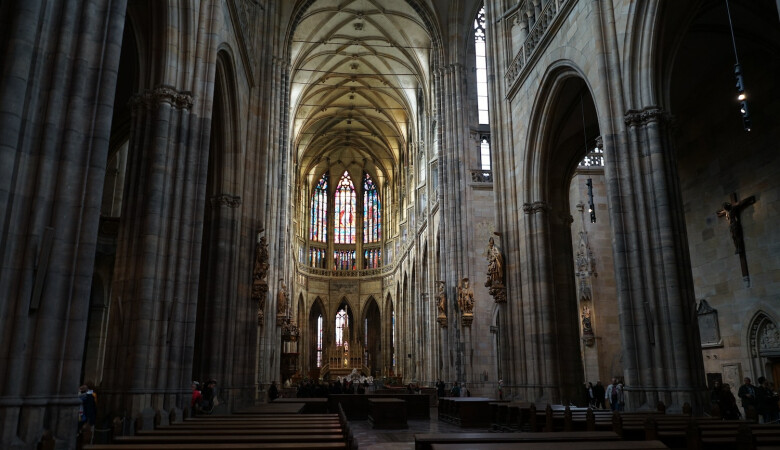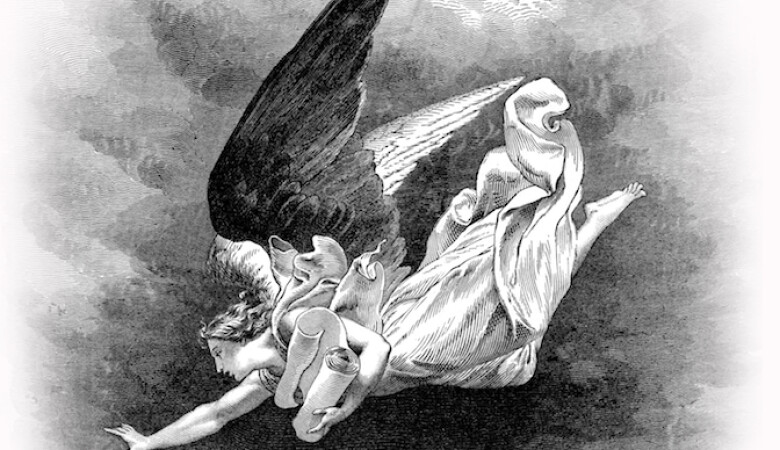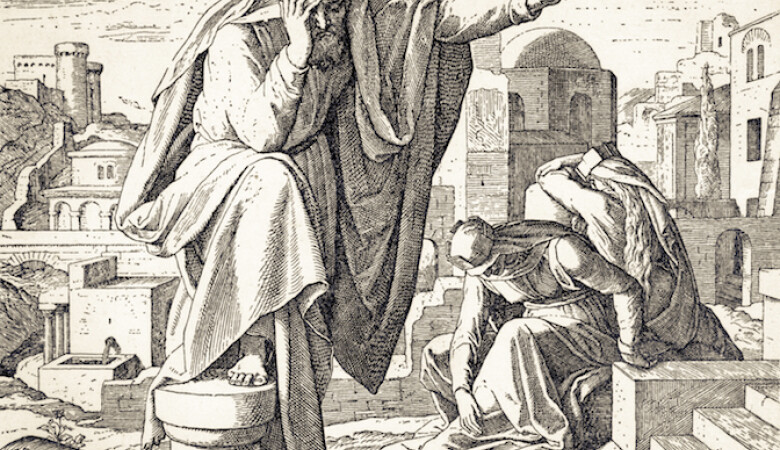The Thousand Years (Revelation Sermon 35 of 49)
February 11, 2018 | Andy Davis
Revelation 20:1-10
sermon transcript
Introduction
Ever since Adam and Eve were evicted from the Garden of Eden and a Cherubim was put at the entrance with a flaming sword flashing back and forth to prevent access to the Tree of Life, the human race has yearned to get back to that place. We have in our hearts a sense of a perfect society in a perfect world, including a perfect government with a perfect economy with perfect human relationships, no war, perfect prosperity and peace, harmony with nature, perfect beauty. Philosophers, artists, political dreamers, and theorists, religious cult leaders and many others have concocted their own views of what this perfect world would look like.
People have been dreaming and writing about this for a long time. In 380 B.C., Plato wrote a book entitled The Republic in which just city states were ruled by philosopher kings bringing in a perfect society. Within a few decades after Christopher Columbus discovered the new world, Sir Thomas More wrote a book called Utopia — meaning literally “no place,” or sometimes “good place” in the Greek — in which he posited an island in the new world in which there was a perfect ideal society. In the 19th century, as America expanded westward, more and more attempts toward creating idealized societies popped up all over the landscape, especially after the Second Great Awakening. These groups were communistic in nature, seeking to create a perfect society in their own space. In 1905, H.G Wells wrote a book called A Modern Utopia. He created the ideal setting on another planet, but with a portal, a doorway in a valley in the Swiss Alps through which one could enter the perfect world.
The Bible has its own ending of the story of mankind after the fall and eviction from the garden in Revelation 20-22. After the Second Coming of Christ, one of two things will happen. Either there will be a thousand-year reign of Jesus Christ physically on the earth, leading ultimately to an eternal state called the New Heaven and the New Earth, or immediately after the Second Coming of Christ on Judgment Day, the New Heaven and the New Earth will be set up.
The thousand-year reign is known as the millennial kingdom, during which Christ reigns physically on earth, a concept which many Christians say is taught in these verses. Satan will be bound for a thousand years and righteousness and blessings will flourish. People will experience lavishly blessed, healthy, long, successful lives. There will still be birth, aging, death, and sin, but those will be reduced and reined in. At the end of the thousand years, Satan will be released for one final battle. These verses speak to this but say nothing beyond naming it as the final battle, Gog and Magog. Immediately following the battle, Judgment Day and the New Heaven and the New Earth will follow.
Either this Millennial kingdom will occur, OR Christ will return, win the battle of Armageddon, and we will go immediately to what is known as the Great White Throne Judgment in which all nations gather and Christ separates the sheep from the goats. Satan and his demons and all the reprobate — the unbelievers — will be judged and cast into the Lake of Fire at once. The righteous will receive their glorified resurrection bodies at once with no possibility of a future fall and sin, and the New Heaven and the New Earth will appear. The first Heaven and the first earth will pass away in a conflagration of fire, Peter tells us, and we will come into the eternal state.
Of the two scenarios, I am not sure which I subscribe to. I always seek to settle every text in the overall corpus of Biblical teaching. I believe in the law of non-contradiction. There is harmony with all of the things God said to us in His Word, and theology is a task of harmonizing everything we read into a growing body of truth and non-contradiction. This is where things get challenging.
The word “millennium” comes from the Latin, meaning “thousand years.” It comes right from this text. Christ’s eternal physical reign on earth in a wonderfully blessed world surrounded by the redeemed from every nation on earth will happen with either scenario. Bible-believing Christians agree that Revelation 21 and 22 describe that. The question is, what is happening in these verses in Revelation 20.
The physical world that we will enjoy in the New Heaven and New Earth, in which we will be in physical bodies, or a “spiritual body” as Paul says in 1 Corinthians 15, is not depicted here in Revelation 20. If anywhere, it is described in Old Testament visionary passages in books such as Isaiah or Ezekiel. Perhaps those passages describe the Millennial kingdom, or perhaps the eternal kingdom, or even the spiritual blessings of the Gospel. Physicality is not what differentiates the Millennium from eternity.
If there is to be a physical Millennium, there is a vast difference between now and that time. The Millennium will be a greatly enhanced blessed world that still includes birth, sin and death, none of which will be included in the eternal state. Now, Christ is reigning physically in Heaven, where he ascended. He is now sitting at the right hand of God, and “Though you have not seen him, you love him; and even though you do not see him now, you believe in him and are filled with an inexpressible and glorious joy…” (1 Peter 1:8). Now, Christ rules his invisible spiritual kingdom by the work of the Holy Spirit in the hearts of converted people. In the Millennial kingdom, Christ will be reigning physically on earth, settling disputes among the nations — necessary because sin nature will still be present. He will cause people to live at peace with one another.
Now, Satan is roaming the earth with his demons continually tempting us to sin. In the Millennium, he will be locked up in a prison, unable to deceive the world. Now, the world system that Satan has set up is continually alluring and enticing us to sin. In a physical Millennium, with Christ reigning on earth, there will be no alluring world system pulling us toward evil and sin.
Now, the world is groaning in bondage to decay and corruption and a cycle of death. In the Millennium, the effects of sin, Adam’s sin will be greatly reduced, but not totally removed. Now, the work that we do is under the curse of Adam. We wrestle with the ground, and it produces thorns and thistles. In the Millennium, labor will be lavishly blessed and fruitful, providing deep satisfaction though not yet perfection. Now, our bodies are racked with pain and sickness, and all of us will die, probably on average around age 80 or so. In the Millennium pain and sickness are reduced though not removed; people are more robustly healthy. Death is deferred, though not entirely removed. People will still die, but on average, they will die much at a much later age.
Revelation 20 does not provide this information about rich blessing and lavish agricultural and long life. In Revelation 19, Christ returns, then in Revelation 20 he binds Satan for a thousand years. During those thousand years, Christ is reigning over the nations; those alive at the time will be occupied in some way. To understand the lavish blessing of having Christ on earth as king, we must look mostly to Old Testament visionary passages like Isaiah 65:17-25.
Interpreting the book of Revelation as a whole, and this particular passage in detail, is challenging. There are not many passages that clearly depict Millennial life that cannot be referring to the New Heaven and the New Earth, or the spiritual blessings of the Gospel, but that refer exclusively to the Millennium. A passage in the Old Testament which describes lavish agricultural blessings on a previously barren land in Isaiah may be referring to the blessings of salvation by faith in Christ, like the outpouring of the Spirit. Jesus frequently used agricultural analogies: “I am the vine; you are the branches. If you remain in me and I in you, you will bear much fruit.” [John 15:5] Descriptions of lavish agricultural blessing may be spiritual rather than literal. We know that Jesus is not literally a vine. He is using agricultural images to teach us the blessings of the Gospel. That passage might be referring to spiritual blessings, or to the blessings of the restoration of Israel from exile to Babylon, or to the blessings of Millennial life, or to the blessings of the New Heaven and the New Earth. The answer to the question “What will millennial life be like?” requires Scripture that cannot refer to the other categories of blessings.
Isaiah does the same thing. For example, Isaiah 44:3-4 says, “For I will pour water on the thirsty land, and streams on the dry ground; I will pour out my Spirit on your offspring, and my blessing on your descendants. They will spring up like grass in a meadow, like poplar trees by flowing streams.” Which of the four categories of blessings does that passage cover? It could be any of the four or all of them. Is Isaiah talking about God literally turning the desert into a paradise, or is he speaking of the effects of the outpouring of the Holy Spirit on people? Whole books, 450-500 pages long, have been written about the Millennium. The topic has been debated throughout history. Augustine debated in his day with Chiliasts, or Millennial thinkers; Calvin and Luther did as well. Jonathan Edwards, following the Calvinist/Augustinian pattern, spiritualized the Millennium, seeing it as the advance of the Gospel throughout church history and the overthrowing of the false Roman Catholic system.
The two views have been in opposition of each other for a long time. I have gone back and forth on the topic, sometimes on Monday one thing and on Tuesday the other. Unlike any other theological topic, the more I study it, the more difficult it gets for me to resolve.
In 2002, I was with a friend of mine at the Southern Baptist Convention in St. Louis, Tom Schreiner, who wrote a very long commentary on the Book of Romans and is a professor of New Testament at Southern Seminary in Louisville. He is, in my opinion, one of the leading New Testament scholars in the world.
At this convention, when we were talking about the Millennium, I was in the process of working out my views at the time, leaning toward Amillennialism. This is the view that the thousand years is symbolic language for the spread of the Gospel throughout the church age, which is recapitulated in the battle of Armageddon ending, or Gog and Magog. In this view, Satan is bound by the spread of the Gospel.
The other option I was considering was Pre-millennialism. Most evangelicals are pre-millennial, they believe in the thousand year reign. Just going back over it, and he said he was a pre-millennialist This view has to do with the timing of the Second Coming relative to the Millennium, meaning Jesus comes back prior to the Millennium, the thousand-year reign of Christ on Earth.
In that conversation, Tom said he was pre-millennial because of the apparently chronological order of the chapters in Revelation, which seem to be unfolding the story of God’s judgment on earth, with Revelation 17 and 18 as an aside describing Babylon. Jesus’ Second Coming is described next, followed by the Millennium, followed by the eternal state. Given his input, I decided that I most agreed with the Pre-millennial view.
Years later, as I was writing my commentary on the book of Isaiah, I came to Isaiah 65:17-25. “‘Behold, I will create new heavens and a new earth. The former things will not be remembered, nor will they come to mind. But be glad and rejoice forever in what I will create, for I will create Jerusalem to be a delight and its people a joy. I will rejoice over Jerusalem and take delight in my people; the sound of weeping and of crying will be heard in it no more. [This sounds like the eternal state in Revelation 21, the New Heaven, New Earth, no more weeping. But listen to verse 20:] Never again will there be in it an infant who lives but a few days, or an old man who does not live out his years; he who dies at a hundred will be thought a mere youth; he who fails to reach a hundred will be considered accursed. [In the New Heaven and New Earth, there is no more death, mourning, crying or pain, but here in verse 20 we see birth (implying marriage) aging, death. Jesus told us in that in the Kingdom, there will be neither marrying nor giving in marriage.] They will build houses and dwell in them; they will plant vineyards and eat their fruit. No longer will they build houses and others live in them, or plant and others eat. For as the days of a tree, so will be the days of my people; my chosen ones will long enjoy the works of their hands. They will not toil in vain or bear children doomed to misfortune; for they will be a people blessed by the LORD, they and their descendants with them. Before they call I will answer; while they are still speaking I will hear. The wolf and the lamb will feed together, and the lion will eat straw like the ox, but dust will be the serpent's food. They will neither harm nor destroy on all my holy mountain,’ says the LORD.”
This passage is key for descriptions of Millennial life and is a doorway to look to other similar passages in Isaiah with other aspects of the Millennial kingdom. It is hard enough to preach or have a conversation about it, but when publishing a commentary, there must be some resolution. So I called Tom Schreiner, described my dilemma with this passage in Isaiah, and asked for his input since he was Pre-millennial.
In the middle of my synopsis, he stopped me and said, “Actually, Andy, I’m Amillennial now.” I could have dropped the phone. I am not the only one who is unresolved on this issue. I am not seeking to confuse you, and I know that some of you are resolved on it. In the history of evangelicalism, some have thought that holding an Amillennial view implies that one is a theological liberal. However, that is ignorant of church history: John Calvin, who was Amillennnial, had a high view of Scripture.
Currently, for the most part, either of these views is acceptable among evangelicals, less fundamental than inerrancy of Scripture regarding bodily resurrection in a resurrected world. If you are active in putting sin to death, growing in holiness, and sharing the gospel, then what you believe about the millennium will not affect your spiritual walk.
We ought to work at it because it is in the Scripture, but with the understanding that the answer will not be finally resolved until it happens. If you are Amillennial and there is a literal Millennium, you will not be left out. You will be where you are supposed to be. If you are Pre-millennial and we go straight to the eternal state, you will not be sad or disappointed.
Sometimes a Pre-millennial view may cause one to focus more on the Millennium the eternal state. Certainly we will be in the Millennium for a while, if there is one, but the eternal state will be for eternity, so we must spend more time on that. Revelation 21-22 clearly describes aspects of the eternal state.
The best I can do to help us figure this out is to read the Scripture and preach it. Romans 4:3 admonishes, “What does the Scripture say?” We will walk through this together through two sermons to do our best to understand it. To any here who are unbelievers, it really does not make a difference what you believe about the Millennium. What matters is that your sins are forgiven through faith in Christ.
First we need to review for context. Revelation 20 will not make much sense if we do not look at where we have been. Revelation is an unveiling of the invisible spiritual world, but also of the future. Revelation 1:1 tells us that Jesus Christ is revealed, given to show his servants what must “soon” take place. The word “soon” means soon in His economy — the next thing that will happen. So this book is given to unfold the future.
In Revelation 4, John goes up through a doorway by the power of the Spirit into Heaven, where he sees God on His throne. The central reality of the universe is God enthroned. We see through John’s eyes a heavenly vision of concentric circles of thrones and worship for God, the Creator. In Revelation 5, we see a scroll in the right hand of the one seated on the throne; the scroll is sealed with seven seals. Jesus the Lion and Lamb, takes that scroll. He has the authority, the right to open it. In Revelation 6, Christ breaks open the seven seals. Each seal contains a judgment sent from Heaven to earth.
In Revelation 7, we see a multitude greater than anyone could count from every tribe, language, people, and nation that are redeemed by the blood of Christ. The redemption of lost people from all over the world is the point of the entire story. Revelation 8-9 bring seven trumpets judgments which devastate a third of the ecology and economy of the earth. They are so grand and vast and devastating that it is not possible to spiritualize them or say they have already happened. Nothing like these judgments has ever been seen. Since he is telling us what must soon take place, they have not yet happened. Revelation 12 shows us, behind the scenes, the serpent — the dragon —mentioned in our text in Revelation 20, who is Satan. We see clearly his hatred for the people of God and for Israel. He desires to pursue and kill the children of the woman who is Israel, as well as believers who follow who follow Christ and obey His commandments. This satanic attack on the people of God on Earth is happening now in the invisible spiritual realm.
In Revelation 13, Satan’s final phase is a devastating attack on the church: he brings forth the Antichrist, or the Beast from the Sea, the one-world ruler who is coming. After that, the Beast from the Earth, who is the false prophet, arises, enabled to do miraculous signs and wonders to deceive the nations. He causes all people to bow down to an idol, a statue of the Antichrist, establishing a wicked one-world religion. As a sign of loyalty to the Antichrist, he causes people to receive a mark on the forehead or on the hand. Those who do not receive it cannot buy or sell, resulting in economic strictures and persecution of people who will not worship the beast. Revelation 14 says that those who do receive the Mark of the Beast will spend eternity in Hell. There is a clear demarcation of believers and unbelievers. The elect, the true followers of Christ, will not bow down, and therefore must run for their lives. It will be a very difficult time.
Revelation 16 depicts the final bowl judgments poured out on the ecology of the world. This time it is not a third but the entire sea turns to blood and every living thing in the sea dies. At the end of Revelation 16 is the battle of Armageddon. Lying, deceiving spirits go around the world and gather everyone together for a climactic battle. Amillennials see this as the same battle as the one in Revelation 20, Gog and Magog. Pre-millennials see it as an additional battle.
Revelation 17 shows the kings of the earth under the Antichrist gathering for this battle with one purpose to give their power to the Antichrist. They gather to fight for him to slaughter the Jews who now believe in Christ, so all Israel will be saved, as Romans 11 says. The kings are coming to Palestine, to Armageddon, ultimately to try to get to Jerusalem to slaughter all of the Jews that are now believing in Christ as their Messiah. They think it will be an easy battle, but they do not understand with whom they are dealing.
In Revelation 19, the Bridegroom returns — the Second Coming of Christ — to rescue his Bride. He wreaks carnage on his enemies — dead bodies everywhere, a river of blood. This climactic battle brings us to Revelation 20, beginning with the binding of Satan.
Satan is Bound
The Millennium Starts with the Binding of Satan
Revelation 20:1-3 says, “And I saw an angel coming down out of Heaven, having the key to the Abyss and holding in his hand a great chain. He seized the dragon, that ancient serpent, who is the devil, or Satan, and bound him for a thousand years. He threw him into the Abyss, and locked and sealed it over him, to keep him from deceiving the nations anymore until the thousand years were ended. After that, he must be set free for a short time.” The chapter opens with a powerful decisive action, the binding of Satan. A single angel, who has the key to the Abyss, comes down from Heaven to bind him. The word “abyss” in the Greek literally means bottomless, so he is thrown into a bottomless pit. Other texts also mention the Abyss as a pit of punishment for demons.
Revelation 9:1-3: “The fifth angel sounded his trumpet, and I saw a star that had fallen from the sky to the earth. The star was given the key to the shaft of the Abyss. When he opened the Abyss, smoke rose from it like the smoke from a gigantic furnace. The sun and sky were darkened by the smoke from the Abyss. And out of the smoke locusts came down upon the earth and were given power like that of scorpions of the earth.” Satan is identified as the king of the Abyss. Revelation 9:11: “They had as king over them the angel of the Abyss, whose name in Hebrew is Abaddon, and in Greek, Apollyon.” Both those words mean “destroyer”. Revelation 9 provides an image of billowing smoke as out of a smoke stack, bringing locusts which plague the earth.
2 Peter 2:4 says that “God did not spare the angels who sinned, but threw them down into Tartarus [in Greek mythology, a deep pit] and delivered them to be kept in chains of darkness until judgment.” This is the same idea, a pit with chains, but those demons were locked up in an earlier time. Some scholars think it was demons that fell right before Noah’s flood, but we do not know. Jude 6 says, “…the angels who did not keep their positions of authority but abandoned their own home — these he has kept in darkness, bound with everlasting chains for judgment on the great Day.” This covers the same thing — demons that fell in some previous time, locked in a pit with a chain.
During Jesus’ ministry on earth, his miraculous signs and wonders included healing people who were possessed and controlled by demons. One was the demoniac of the Gadarenes — naked, howling at the moon, breaking chains — a terror to the entire population of the surrounding countryside.
Luke 8:30-31: “Jesus asked him, “‘What is your name?’ ‘Legion,’ he replied, because many demons had gone into him. And they begged him repeatedly not to order them to go into the Abyss.” They plead with Jesus not to send them prematurely to their prison; they want to retain their freedom to roam about causing trouble. After he drives them out, they inhabit a herd of pigs, which go mad and rush into the sea and die. We can imagine that as they are begging not to be sent to the Abyss, they have in mind the other demons who were sent there. Here, Satan is seized by this angel with a commission from God, bound with a great chain and thrown into the Abyss.
Jesus Binds Satan
Key to the Amillennial position is the idea that when Jesus came to earth the first time and began preaching the Kingdom of God, to some degree he bound Satan. Jesus’ enemies — Scribes, Pharisees, and other unbelieving Jewish leaders — claimed that he was a deceiver and was driving out demons by Beelzebub, the king of demons. In reply, Jesus described what he was truly doing. Matthew 12:29 says, “…how can anyone enter a strong man's house and carry off his possessions unless he first ties up the strong man? Then he can rob his house.” The strong man is Satan; Satan’s possessions are people. The one stronger than the strong man is Jesus, who overpowers this strong man and ties him up, enabling him to steal people from Satan’s dark kingdom. The Amillennial view says that is what the thousand years is all about. The binding of Satan is a provisional binding to keep him from deceiving people in reference to the Gospel, so that the Kingdom of God can advance. Another passage like this, Luke 11:21-23, says, “When a strong man, fully armed, guards his own house, his possessions are safe. But when someone stronger attacks and overpowers him, he takes away the armor in which the man trusted and divides up the spoils. He who is not with me is against me, and he who does not gather with me, scatters.”
In other words, gathering and assembling the Kingdom of God is an act of spiritual violence. He is conquering a wicked king, plundering his kingdom, building the kingdom out of plundered living stones that have been quarried from a dark kingdom, sending his church over the walls of Hades — the gates of Hell will not prevail against it. We undertake a rescue mission into dark territory to rescue living stones; we plunder and Satan cannot stop us. This has been going on for 2000 years. Colossians 1:13 says, “For he has rescued us from the dominion of darkness and brought us into the kingdom of the Son he loves.” We have been rescued from that dark kingdom, and Jesus bound the strong man to make that happen.
The Purpose and Result of Binding
The purpose and result of the binding is clear. Revelation 20:3 says, “He threw him into the Abyss, and locked and sealed it over him, to keep him from deceiving the nations anymore until the thousand years were ended.” The essence of Satan’s power and reign is lies. This is how he deceives the nations and rules his kingdom. When God said to Eve in the Garden, “What have you done?” she replied, “The serpent deceived me and I ate.” Jesus said of His enemies, who hated the Gospel, in John 8:44: “You belong to your father, the devil, and you want to carry out your father’s desire. He was a murderer from the beginning, not holding to the truth, for there is no truth in him. When he lies, he speaks his native language, for he is a liar and the father of lies.” Satan’s deception of the nations has been essential to his kingdom. It is what he does.
He deceives every generation through the lust of the eyes, the lust of the flesh, and the boastful pride of life. “Sin won’t damage you. It’s fine.” He deceives people into false religions — Hinduism, Buddhism, Islam are all constructs of the Devil. He is lying to their adherents and to atheists and other philosophical systems. All are included in the system of lies and deceptions. The greatest deception ever will come from the reign of Antichrist. 2nd Thessalonians 2 says, “He will send them a powerful delusion.” This will come through the whole story of the Antichrist, by the fact that he and the false prophet are able to do miraculous signs and wonders to deceive even the elect, Jesus said, if that were possible. It is not possible, but that is a powerful delusion.
If there is a literal Millennium, the people who live on the earth at that time will come to faith in Christ, like all of us did. Likely, there will not be a different system of justification then, meaning those in that generation must also believe in Jesus, but it will be very different than it was for us. They will have the tremendous advantage of not having to overcome Satan with his system of lies in the world, having to overcome false religions. I imagine there will not be any. They will believe in a literal, physical Jesus right in front of them, just as people — like the thief on the cross, Peter, and others — in Jesus’ age did. That does not mean that every single solitary person in the Millennium will be a believer in Christ. There will be some unbelievers, and they will be the ones gathered at the end to fight that final battle.
The “Thousand Years” and Other Numbers
All we can say about the number 1000 is that it is ten times ten times ten — ten cubed, a perfect number. Just because it is a perfect number does not mean it is not a literal number. Symbolic and literal are not mutually exclusive. Frequently in the Bible, the word thousand years can mean a long time, as in 2 Peter 3:8: “With the Lord a day is like a thousand years, and a thousand years are like a day.” Psalm 90 says, “A thousand years in your sight are like an evening watch that goes by.” This could refer to a long time or a literal thousand years.
How “Bound” Is Satan? Is He Bound NOW?
The question in front of us that Amillennials must struggle with is whether Satan is bound now. In Revelation 20, Satan is locked up, wrapped up with a great chain and thrown and sealed into the Abyss. He is not limited or blocked in that verse; he cannot be more bound than that.
But we do not see that either scripturally or experientially. Right now, Satan is fighting everything we are trying to do. Many verses in the New Testament say that. For instance, the Kingdom of Heaven is like a man who sowed seed — some seed fell on the path and the birds came and ate it up. When one hears the word and does not receive it, Satan comes and snatches away what was sown in his heart. That is happening all the time. Satan follows behind preachers like me, and if people do not have a soft heart, he plucks away immediately any impact of what they have heard. Satan is active. Ephesians 6 admonishes us to put on the full armor of God, not because Satan is locked up, chained in the bottom of a pit, but because “our struggle is not against flesh and blood, but against the rulers, against the authorities, against the powers of this dark world and against the spiritual forces of evil in the heavenly realms.” James 4:7 says, “Resist the devil and he will flee from you.” We are told in 1 Peter 5:8-9, “Be self-controlled and alert. Your enemy the devil prowls around like a roaring lion looking for someone to devour.” That is not restrained, chained and thrown in a pit. No, he is out and about.
We need to be aware of what he is doing. 1 Corinthians 5:5 says, “…hand this man over to Satan, so that the sinful nature may be destroyed and his spirit saved on the day of the Lord.” Satan is not bound and thrown in a pit. He was active in Corinth in this man’s life; Paul said to hand him over to the unbelievers, the wicked surrounding satanic world. When he repented, Paul said to welcome him back (2 Corinthians 2:11) “…in order that Satan might not outwit us. For we are not unaware of his schemes.” Paul recognized that he is always fighting Satan. “For we wanted to come to you—certainly I, Paul, did, again and again—but Satan blocked our way.” [1 Thessalonians 2:18] This is a strong argument then for the Pre-millennial interpretation of Revelation 20:1.
I cannot leave it like that. Next week we will go to the other side to balance our understanding. I will make the quick point that I do not accept a literal Millennium outright without question because The biggest problem I have is that it does not seem to be taught clearly anywhere else in the New Testament. For example, the Apostle Paul does not seem to acknowledge it. In 1 Corinthians 15, when Paul talks about the bodily resurrection, you would think he would mention a thousand years in which there is a partial resurrection. 1 Corinthians 15 makes us long for our full resurrection body. Christ is the first fruit of resurrection, then when he comes, believers will be resurrected, but will it be only partial?
I think these questions are worth asking, but they are not ultimate or fundamental questions. We all have eternal souls, and as I said, the next thing that will happen after the Second Coming is either this or that. No matter what happens with the Millennium, it is appointed for each one of us to die unless we are in the final generation. After death, we face judgment. If you have not come to faith in Christ, you will be lost. If you came here today as an unbeliever, perhaps you are confused about what you have heard. Perhaps you want to know how your sins can be forgiven. Maybe you are feeling guilty for the ways that you violated your conscience or feeling lost with no purpose or feeling desperate.
It is my joy, my duty and my responsibility to tell you that there is good news in Christ. The Millennium is not the most important thing I have to say to you. No, the most important thing is that Christ died for your sins according to the Scriptures; He was buried and He was raised from the dead on the third day. If you repent — turn away from your sins and trust in Him — you will have eternal life.
Lord, thank you for the time we have had to consider the difficult, challenging topic of the Millennium. We thank you, Lord, for the provision that you have made for sinners like us at the cross, for the empty tomb, and for Christians to commemorate that through the Lord’s Supper. We ask now that You would bless us with your presence, and that you would strengthen our faith and help us to partake in a manner worthy of the Lord. We pray these things in Jesus’ name. Amen.






























